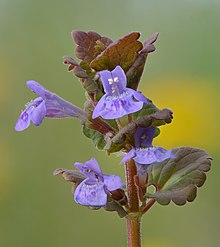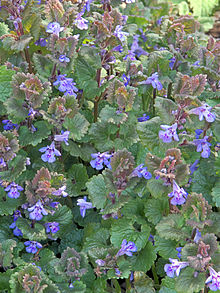| Glechoma hederacea | |
|---|---|

| |
| Scientific classification | |
| Kingdom: | Plantae |
| Clade: | Tracheophytes |
| Clade: | Angiosperms |
| Clade: | Eudicots |
| Clade: | Asterids |
| Order: | Lamiales |
| Family: | Lamiaceae |
| Genus: | Glechoma |
| Species: | G. hederacea
|
| Binomial name | |
| Glechoma hederacea | |
| Synonyms[1] | |
|
List
| |


Glechoma hederacea is an aromatic, perennial, evergreen creeper of the mint family Lamiaceae. It is commonly known as ground-ivy, gill-over-the-ground,[2] creeping charlie, alehoof, tunhoof, catsfoot, field balm, and run-away-robin.[2] It is also sometimes known as creeping jenny, but that name more commonly refers to Lysimachia nummularia. It is used as a salad green in many countries. European settlers carried it around the world, and it has become a well-established introduced and naturalized plant in a wide variety of localities. It is also considered an aggressive invasive weed of woodlands and lawns in some parts of North America. In the absence of any biological control, research conducted by the USDA[3] herbicides are relied upon (despite their drawbacks) particularly for woodland ecosystems. The plant's extensive root system makes it difficult to eradicate by hand-pulling.
- ^ "Glechoma hederacea L." Plants of the World Online. Royal Botanic Gardens, Kew. Retrieved 20 November 2024.
- ^ a b Cite error: The named reference
caeswas invoked but never defined (see the help page). - ^ Waggy, Melissa (2009). "Glechoma hederacea". USDA FEIS. United States government. Retrieved 19 March 2018.